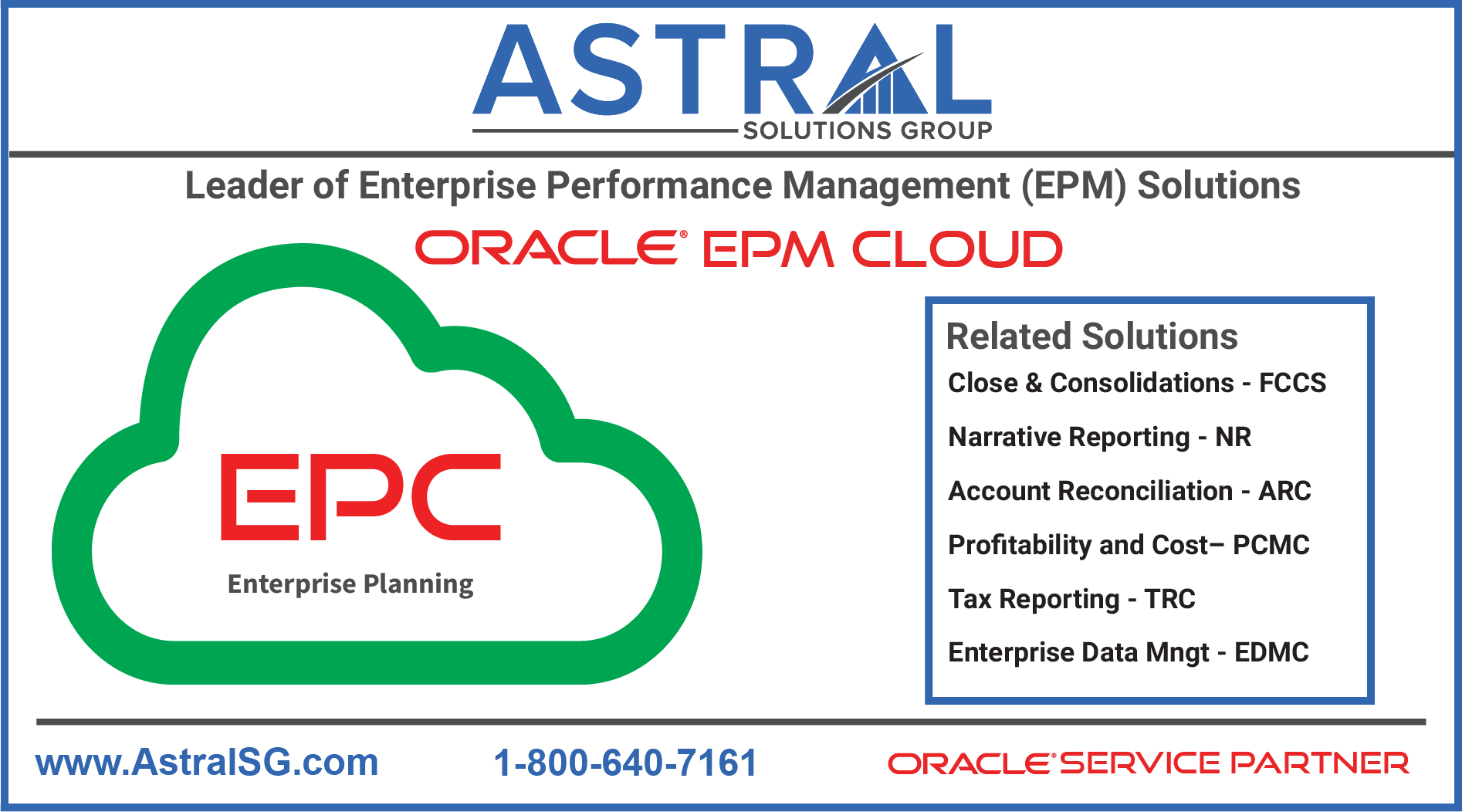
Oracle Enterprise Planning and Budgeting Cloud Service, often known as EPC or EPBCS, is a potent tool that aids businesses in managing their planning and budgeting procedures more successfully and successfully. With the help of the cloud-based EPBCS system, businesses can streamline collaboration, automate budgeting and planning, and make better decisions
In today’s dynamic business climate, organizations must be flexible and adaptable. By offering a comprehensive solution that enables businesses to plan, budget, forecast, and analyze their financial and operational data, EPBCS assists enterprises in achieving this goal.
Many features and advantages offered by EPBCS enable businesses to simplify their planning and budgeting procedures.
Some of the key benefits of EPBCS or EPC are:
- Improved Collaboration: EPBCS enables teams to collaborate on planning and budgeting tasks in real-time, which improves communication and keeps everyone on the same page. Teams can communicate more effectively and make fewer mistakes when sharing information, feedback, and insights readily.
- Increased Efficiency: Organizations may automate many manual budgeting and planning processes with EPBCS. This improves productivity and reduces the time and effort needed to execute these jobs.
- Accurate Forecasting: Organizations are given access to an effective forecasting engine through EPBCS, enabling them to predict future outcomes precisely. As a result, businesses can make smarter judgements and modify their plans and budgets as necessary.
- Flexible Planning: Organizations are given a flexible planning framework by EPBCS, which enables them to respond swiftly to shifting market conditions. New information can be quickly incorporated into an organization’s plans and finances, allowing it to remain competitive.
- Enhanced Reporting: Organizations can access powerful reporting and analytics capabilities from EPBCS to learn more about their financial and operational data. Organizations can use this to spot trends, patterns, and areas for development.
- Reduced Costs: Because EPBCS is a cloud-based solution, businesses no longer need to spend money on pricey IT infrastructure, software, and hardware. This enables enterprises to save expenses while concentrating on their primary operations.
- Scalability: The scalable EPBCS system may expand with enterprises as their needs change. The system’s ease of use makes it easier for businesses to add new employees, divisions, and business units, which helps to keep the solution current over time.
A thorough planning and budgeting system, EPBCS enables businesses to improve cooperation, streamline operations, and reach more informed decisions. With the help of EPBCS, companies may improve the speed, accuracy, and adaptability of their planning and budgeting procedures, enabling them to remain competitive in the current fast-paced business environment.
Enterprise Planning and Budgeting Cloud Service (EPBCS) offers a variety of essential capabilities that aid businesses in streamlining their planning and budgeting procedures.
Here are some of the key features of EPBCS (Enterprise Planning and Budgeting Cloud Service):
Strategy
- Strategic Planning: Organizations can develop and manage their strategic plans, which include goals, objectives, initiatives, and KPIs, thanks to EPBCS.
- Strategy Maps: Organizations can visualize the connection between their strategic objectives and the actions that support them using the strategy map capabilities offered by EPBCS.
Financials
- Financial Planning: The EPBCS offers complete financial planning capabilities, including cash flow planning, income statements, and balance sheets.
- What-if Analysis: Organizations can use what-if analysis using EPBCS to assess how different situations affect their financial performance.
- Driver-Based Modeling: Organizations can build driver-based financial models using EPBCS, which helps them to identify the primary factors influencing their financial performance.
Workforce
- Workforce Planning: To prepare for headcount, salary, and compensation costs, firms can use the workforce planning tools offered by EPBCS.
- Workforce Analytics: Organizations can use the capabilities offered by EPBCS to acquire insights into employee demographics, turnover rates, and retention rates.
Projects
- Project Planning: Planning and managing projects, including resource management, cost control, and project scheduling, are made possible by EPBCS for businesses.
- Project Analytics: Organizations can use the capability offered by EPBCS to learn more about their project data, including project status, resource use, and cost.
Capital
- Capital Planning: Organizations can plan and manage their capital expenditures using the features offered by EPBCS, including asset purchase, depreciation, and amortization.
- Capital Analytics: Organizations can use the capabilities offered by EPBCS to learn more about their capital data, including capital outlays, capitalization rates, and return on investment.
Sales
- Sales Planning: With the help of EPBCS, businesses may organize and control their sales, including revenue planning, sales quotas, and sales compensation.
- Sales Analytics: Organizations can use the sales analytics capability offered by EPBCS to learn more about their sales data, including sales performance, sales by product, and sales by area.
Integration to HCM
- Organizations can include their HCM data in their planning and budgeting procedures with the help of EPBCS. This comprises data on headcount, wages, benefits, and other HR-related topics.
- Organizations can improve their labour needs and expense management by incorporating HCM data into EPBCS to help them produce more accurate workforce plans and projections.
- Additionally, EPBCS may assist firms in assessing the effects of various workforce scenarios on their financial performance, such as the expense of employing new employees or the cost savings connected with reducing headcount.
- Integrating EPBCS and HCM facilitates collaboration between the HR and finance teams. It also guarantees that HR choices are made with a thorough grasp of their financial ramifications and that workforce strategies align with financial goals and objectives.
Integration to CX
- EPBCS also integrates with Oracle’s Customer Experience (CX) cloud, allowing businesses to incorporate customer data into their financial planning and forecasting. The integration will enable businesses to use customer data to inform sales forecasting and planning and track performance against customer KPIs.
In general, Oracle Cloud EPM – EPBCS is a complete solution that provides various functions to aid firms in streamlining their financial planning and forecasting procedures. Regarding personnel planning, sales forecasting, and financial forecasting, EPBCS gives organizations the resources to make wise decisions and accomplish their strategic objectives.
Conclusion
For companies wishing to automate their financial planning and forecasting procedures, EPBCS is a healthy option. Strategic planning, finances, personnel planning, projects, capital planning, sales forecasting, and connection with source systems, HCM and CX clouds are just a few of the many functions offered by the software. These capabilities can help firms expand visibility and control, boost cooperation and communication, increase accuracy and efficiency, and achieve considerable cost savings.
The cloud-based nature of Oracle Cloud EPM – EPC or EPBCS makes it simple to scale up or down in response to shifting business requirements. Additionally, it provides improved security and compliance capabilities, assisting organizations in protecting their financial data and adhering to legal obligations.
EPBCS is a helpful tool for companies of all sizes and sectors. Companies may make informed judgements, improve their financial performance, and accomplish their strategic goals by utilizing the software’s powerful features and capabilities.
Contact us and we would love to share our experience with Oracle Enterprise Planning and Budgeting Cloud Services. Please email at info@astralsg.com to learn more about our experience with Enterprise Planning and Budgeting Cloud Services.




